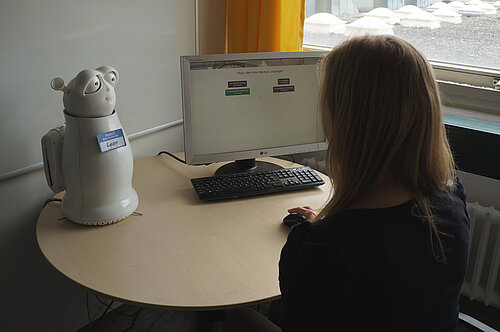Technology-supported Education

In today’s society, self-directed and lifelong learning is gaining increased importance. Technology enhanced learning can thereby support the learner and enhance the learning experience.
In our research, we integrate different forms of technology-enhanced learning such as the addition of gamification elements into (mobile) learning environments, and investigate their impact on the learners’ motivation, perception or learning gain.
Social robots are designed to interact with people in a natural manner and are able to interact with people using verbal and non-verbal signals. One of their major areas of application lies in education, where they can support learners as companions, tutors or teachers. We are particularly interested in the potential of social robots in higher education and investigate different strategies to scaffold motivation, engagement and other factors that support learning.
Involved researchers
Dr. Philipp Schaper
Related publications
-
Digitale Leseförderung: Effekte eines silbenbasierten digitalen Lesetrainings in Klasse 2. . In Vortrag auf dem 52. Kongress der Deutschen Gesellschaft für Psychologie (DGPs). 2022.
-
Iteratively Digitizing an Analogue Syllable-Based Reading Intervention. . In Interacting with Computers. Oxford University Press, 2022.
-
Second Language Learning through Storytelling with a Social Robot-An Online Case Study. . In 2022 31st IEEE International Conference on Robot and Human Interactive Communication (RO-MAN), pp. 67–74. IEEE, 2022.
-
Social Robots in Applied Settings: A Long-Term Study on Adaptive Robotic Tutors in Higher Education. . In Frontiers in Robotics and AI, 9. Frontiers Media SA, 2022.
-
Integration of a social robot and gamification in adult learning and effects on motivation, engagement and performance. . In AI & Society. Springer, 2022.
-
Addressing Motivation in an E-Learning Scenario by applying Narration and Choice. . In Proceedings of the 35th British Human-Computer Interaction Conference (BCS HCI 22). 2022.
-
Investigating Adaptive Robot Tutoring in a Long-Term Interaction in Higher Education. . In 31st IEEE International Conference on Robot and Human Interactive Communication (RO-MAN 2022), pp. 171–178. IEEE, 2022.
-
A Theory Based Adaptive Pedagogical Agent in a Reading App for Primary Students - A User Study. . In Intelligent Tutoring Systems. ITS 2022. Lecture Notes in Computer Science, Vol. 13284, S. Crossley, E. Popescu (eds.). Springer, 2022.
-
Internalisation of Situational Motivation in an E-Learning Scenario Using Gamification. . In International Conference on Artificial Intelligence in Education (AIED 2021), pp. 314–319. Springer, 2021.
-
Towards a digital syllable-based reading intervention: An interview study with second-graders. . In British HCI Conference 2021 (BCS-HCI 2021). 2021.
-
Digitale Leseförderung: Konzeption und Evaluation der "Mobilen Leseförderung". . In Round Table-Session präsentiert auf der Online-Tagung der Fachgruppe Pädagogische Psychologie der Deutschen Gesellschaft für Psychologie (DGPs). 2021.
-
Towards Adaptive Robotic Tutors in Universities: A Field Study. . In International Conference on Persuasive Technology (PERSUASIVE 2021). Springer, 2021.
-
Social robots and gamification for technology supported learning: An empirical study on engagement and motivation. . In Computers in Human Behavior, 121, p. 106792. Elsevier, 2021.
-
Integrating a Social Robot in Higher Education – A Field Study. . In 29th IEEE International Conference on Robot and Human Interactive Communication (RO-MAN 2020), pp. 573–579. 2020.
-
Scaffolding of motivation in learning using a social robot. . In Computers & Education, 125, pp. 182–190. 2018.
-
Female Robots as Role-models? The Influence of Robot Gender and Learning Materials on Learning Success. . In International Conference on Artificial Intelligence in Education (AIED 2018), pp. 276–280. Springer, 2018.
-
Learning to Overcome Cultural Conflict through Engaging with Intelligent Agents in Synthetic Cultures. . In International Journal of Artificial Intelligence in Education, 25(2), pp. 291–317. 2015.
-
Games are Better than Books: In-Situ Comparison of an Interactive Job Interview Game with Conventional Training. . In 17th International Conference on Artificial Intelligence in Education (AIED 2015), of LNCS, C. Conati, N. Heffernan, A. Mitrovic, F. M. Verdejo (eds.). Springer, 2015.
-
Werewolves, Cheats, and Cultural Sensitivity. . In International Conference on Autonomous Agents and Multiagent Systems (AAMAS 2014), A. L. C. Bazzan, M. N. Huhns, A. Lomuscio, P. Scerri (eds.), pp. 1085–1092. IFAAMAS, 2014.


